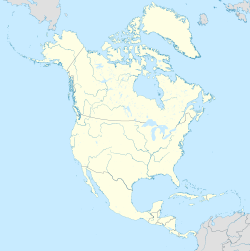Fort Yukon, Alaska
Gwichyaa Zheh | |
|---|---|
| City of Fort Yukon | |
 | |
| Coordinates: 66°34′3″N 145°15′23″W / 66.56750°N 145.25639°W | |
| Country | United States |
| State | Alaska |
| Census Area | Yukon-Koyukuk |
| Incorporated | February 17, 1959[1] |
| Government | |
| • Mayor | Richard Carroll, Jr. |
| • State senator | Click Bishop (R) |
| • State rep. | Mike Cronk (R) |
| Area | |
• Total | 6.94 sq mi (17.97 km2) |
| • Land | 6.74 sq mi (17.47 km2) |
| • Water | 0.20 sq mi (0.51 km2) |
| Elevation | 427 ft (130 m) |
| Population (2020) | |
• Total | 428 |
| • Density | 63.46/sq mi (24.50/km2) |
| Time zone | UTC-9 (Alaska (AKST)) |
| • Summer (DST) | UTC-8 (AKDT) |
| ZIP code | 99740 |
| Area code | 907 |
| FIPS code | 02-26760 |
| GNIS feature ID | 1402276 |
Fort Yukon (Gwichyaa Zheh in Gwich'in) is a city in the Yukon-Koyukuk Census Area in the U.S. state of Alaska, straddling the Arctic Circle. The population, predominantly Gwich'in Alaska Natives, was 428 at the 2020 census, down from 595 in 2000.
Fort Yukon was the hometown of the late Alaska Congressman Don Young. Served by Fort Yukon Airport, it is also known for having the record highest temperature in Alaska.[3]
- ^ 1996 Alaska Municipal Officials Directory. Juneau: Alaska Municipal League/Alaska Department of Community and Regional Affairs. January 1996. p. 57.
- ^ "2020 U.S. Gazetteer Files". United States Census Bureau. Retrieved October 29, 2021.
- ^ "Alaska State Almanac - General information about Alaska from NETSTATE.COM". Archived from the original on May 7, 2016. Retrieved April 22, 2016.

